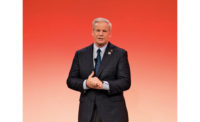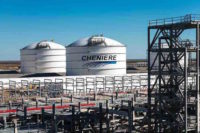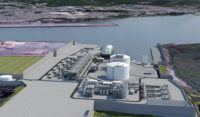Companies building new liquefied natural gas terminals along the Gulf Coast will be getting more service and closer supervision after the Federal Energy Regulatory Commission opens a new office in Houston.
The new office, announced July 23, will help the LNG application, construction and operation process move more efficiently, says FERC spokeswoman Tamara Young-Allen. FERC, along with the Pipeline and Hazardous Materials Safety Administration and the Department of Transportation, oversee the applications and operations of LNG projects.
The new office doesn’t indicate a surge of applications, or that the applications will move more quickly, but instead is meant to take advantage of the industry expertise that is in Houston, she adds.
“Much of the work related to these LNG projects, and the expertise it requires, is based in and around Houston, the so-called ‘Energy Capital of the World,’” FERC Chairman Neil Chatterjee said in a statement.
The eight workers in Houston will join a team of 20 in Washington D.C. under a newly created Division of LNG Facility Review and Inspection.
Cheap natural gas has led to a boom of LNG export terminals in the United States. There are four export facilities in operation today, with two more set be in online by the end of 2020. An additional six terminals have received approval and are under construction, and a further five more have been approved but are not yet under construction.
“FERC’s plan to open a Houston office is a welcome development that reflects the growing nature of our industry and the opportunity that it presents,” said Charlie Riedl, executive director for the Center for LNG. “ The Commission’s important work and oversight of LNG terminals is critical for our growing industry. Having the office in Houston will help the industry and regulators alike. “
On Monday, Morgan Stanley analysts forecasted the United States will lead the world in LNG exports by 2025.
The multi-billion LNG complexes have strained industry resources in the Gulf Coast, which is also seeing a boom in chemical plant construction. Bechtel, McDermott and Zachry, among others, are among the companies building the plants. Most recently KBR was announced as the preferred bidder for the engineering, procurement, construction and commissioning of the fourth LNG train at Freeport’s LNG terminal in Texas.
This selection was made following completion of a nine-month front-end engineering and design verification, execution planning, and EPC proposal process. The fourth train will be similar to the first three trains at the complex, which were built by McDermott.
FERC has begun working with the General Services Administration on space requirements in Houston. Postings for the new positions will be made shortly, according to FERC.






Post a comment to this article
Report Abusive Comment